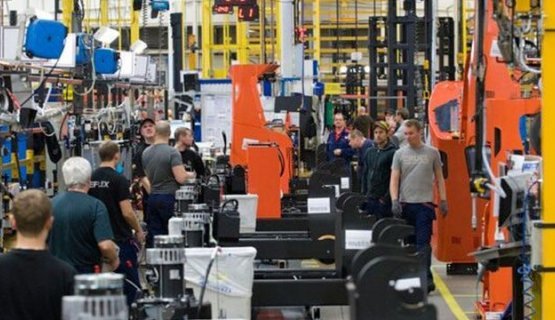Toyota Production System is home of Lean and the most famous (and also widely reported and well-known) production system in the world. Seeing a Toyota factory live is definitely interesting, especially if you have the luxury of visiting the factory in the company of highly professional production people studying in the Diploma in Operations Management program. What are the key take-aways from the two-day visit for a group like this?
The Toyota forklift factory in Mjölby, Sweden, is with 76,000 square meters and 1,850 employees one of the world’s biggest factory for producing material handling equipment. Originally a Swedish company (BT), it has been acquired by Toyota Industries Corporation in 2000. Although not part of Toyota Motor Company, the Material Handling division is a true Toyota Production System factory.
Lessons learnt by Diploma in Operations Management program participants during a visit to Toyota Material Handling’s forklift factory in Sweden
Our visit started with a general introduction to the history of the company and especially to the Toyota Production System, and how it has been adopted in Mjölby after the acquisition of the factory. One of the key messages was that Lean is mainly a culture. Yes, there are a lot of principles and tools, but in the essence Lean means a relentless culture for committing to quality and continuous improvement.
This is strikingly visible in the factory: daily management system is well structured and systematic. Results are visible on many levels in real-time, deviations are noticed and the problem solving process from deviations to solutions works in fast cycles producing solutions efficiently. The group pointed out, that the factory itself is – well, a normal well organized factory, but not a rocket science facility – but the main difference to almost any other facility is in the systematic, structured and thorough continuous improvement and the culture created by this.
Another striking feature of the factory is how everyone knows exactly what they should be doing."
Another striking feature of the factory is how everyone knows exactly what they should be doing. Work instructions are visible, well-updated and followed. There is a special room, DOJO, for training new employees but also used for current employees for practicing new skills or refreshing regularly existing skills. The skills are followed systematically, and job rotation is encouraged, both from operator to team leader and into different team area. In daily work, the targets and accumulated results are shown clearly in every area of the factory, so everyone is updated on how they are doing and knows to finish their job.
We had a chance to visit also the separate special products factory. The flexibility in the product scope was news for many of us: it seems that the special products factory can produce merely every kind of forklift: extra long forks, special hights, automation, special grips…The trick seems to be that the complexity is separated from mass. The main factory producing the basic variant is streamlined to high-volume efficiently whereas the special products factory focuses on flexibility.
The trick seems to be that the complexity is separated from mass."
One of the highlights of our visit was to learn about the history of the company, about the improvement journey after being acquisitioned by Toyota. For the first years, the main focus was on improving the quality, and only after it has been brought to a much better level, the main improvements of the flow started.
Our group found interesting that the first main pilot for improving the flow through a different line setup in production was done in a team, which was already producing good results to start with. The logic behind this choice was that failure was not an option: by choosing a good and motivated team it was more likely to reach a major improvement. This had a motivating effect towards other teams: after the successful pilot and some other success stories people started to ask for the change in their teams as well.
The group also thought that the current commitment to Toyota Production System was remarkable and seen both in management presentation but also at the operator level.
We were also happy to gain some insights into the Hoshin Kanri –systematics of Toyota: achieving major improvements through a challenging 5 year goal and breaking this up into different actions to achieve the goal. With the North Star in everyone’s eyes it is easier to commit to the challenging goal and corresponding change.
Last but not least: the group enjoyed very much the visit and gained valuable insights. One big reason for the success of the trip was the openness by Toyota staff, and the professional visit organization with insightful presentations. Thank you!
Edited by Marja Blomqvist from the travel report by Pasi Kari, Kimo Kekki, Mika Korkea-Aho, Jouni Korkia-aho and Juha Jääskelä, supported by comments from the whole Diploma in Operations Management 2017 group.
The article was originally published in the member magazine of Finnish Production Management Society (STO).
Diploma in Operations Management (DOM), observes production strategy as a part of company's business strategy, offering various tools for every levels of production management. Read more about the program.













